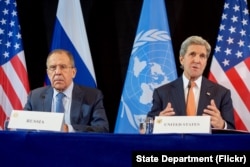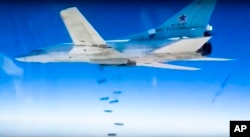Russia's prime minister says accusations his country is bombing civilians in Syria are "just not true."
Speaking Saturday at a security conference in Munich, Prime Minister Dmitry Medvedev said "there is no evidence" of such bombings.
He made the comment moments after French Prime Minister Manuel Valls called on Russia to stop bombing civilians in Syria, saying it was crucial in order to reach any peaceful solution.
The Russian and French prime ministers are among delegates from Europe, the U.S. and elsewhere meeting again Saturday in attempts to end nearly five years of violence in Syria.
On Friday, just hours after world leaders announced a deal at the conference to push for a cessation of hostilities in Syria within a week, the agreement was put to the test.
In an interview published Friday, Syrian President Bashar al-Assad told the French News Agency that his forces planned to “retake the whole country,” fueling doubts about the parties’ commitment to end the nearly five-year-old conflict.
Assad said recapturing all of the territory could take “a long time.” The Syrian president said he supported peace efforts, but he cautioned that the negotiations did “not mean that we stop fighting terrorism.”
Holes in the deal
Observers who acknowledged disconnects in the deal agreed Thursday that those discrepancies could allow Assad’s forces, with Russia’s help, to keep up their assault on rebel areas.
For one, the agreement does not provide for any truce in the Syrian government’s fight against terrorists, including Islamic State militants and the al-Nusra Front.
The Assad government considers all opposition fighters — both moderates and extremists — terrorists. Russia has continued to bomb what it says are terrorist targets, enabling Assad’s forces to make considerable gains recently around Aleppo, Syria’s largest city.
Syrian rebels continue to accuse Russia’s warplanes of indiscriminately striking civilians and the moderate opposition.
Measured expectations
In announcing the deal to push for a pause in hostilities, U.S. officials were cautious in their expectations.
Secretary of State John Kerry said the agreement was “on paper” only, emphasizing that “the real test” would be whether all parties honored their commitments.
U.S. officials laid out the mechanics of the multinational plan designed to provide Syrians with relief from military strikes. Crafted by the International Syria Support Group, it calls for a “cessation of hostilities.” The Syrian opposition requested that the pause in military action be labeled a “cessation” as opposed to a cease-fire, Kerry said.
Later in a Friday briefing, a senior State Department official elaborated on the distinction, saying the Syrian opposition thought a cease-fire indicated a formal end to the fighting in which the “political objectives that underlie the conflict have either been abandoned or resolved,” a situation that has not occurred in Syria.
“The bottom-line objective is to stop the violence,” said the official.
Another objective is to allow humanitarian aid to reach civilians in rebel-held areas. This was one key condition that representatives of the Syrian opposition said had to be met before they would rejoin indirect peace talks that broke off last week in Geneva. U.S. and U.N. officials are working to resume the dialogue later this month.
As part of the plan, the U.S. and Russia will head a task force that will work to delineate the territory held by terrorist groups and resolve any noncompliance with the cessation.
“In terms of how this is going to play out, I think you can expect that it will not be smooth and it will not be clean,” the senior State Department official said. “There will be problems to work through, perceived violations — most likely on both sides.”
The Syrian opposition stopped short of welcoming the agreement, but saw it as an incremental step forward. Salem Meslet, speaking for the main opposition group, the High Negotiations Committee, said, “We must see action on the ground in Syria.”
There were questions about whether the agreement by world leaders to seek a cessation of hostilities in Syria marked the beginning of a lasting deal for peace, or whether it was simply a stopgap measure by world politicians to make it appear as though they were addressing a situation that is out of control.
Following through on humanitarian aid
International human rights advocates on Friday urged world leaders to follow through with commitments they say could alleviate the suffering of millions of Syrians.
“It is essential that strenuous diplomatic efforts continue beyond today’s headlines to ensure that the human rights and humanitarian-related provisions agreed are adhered to by all parties,” said Philip Luther, director of Amnesty International’s Middle East and North Africa Program, in a statement to VOA.







